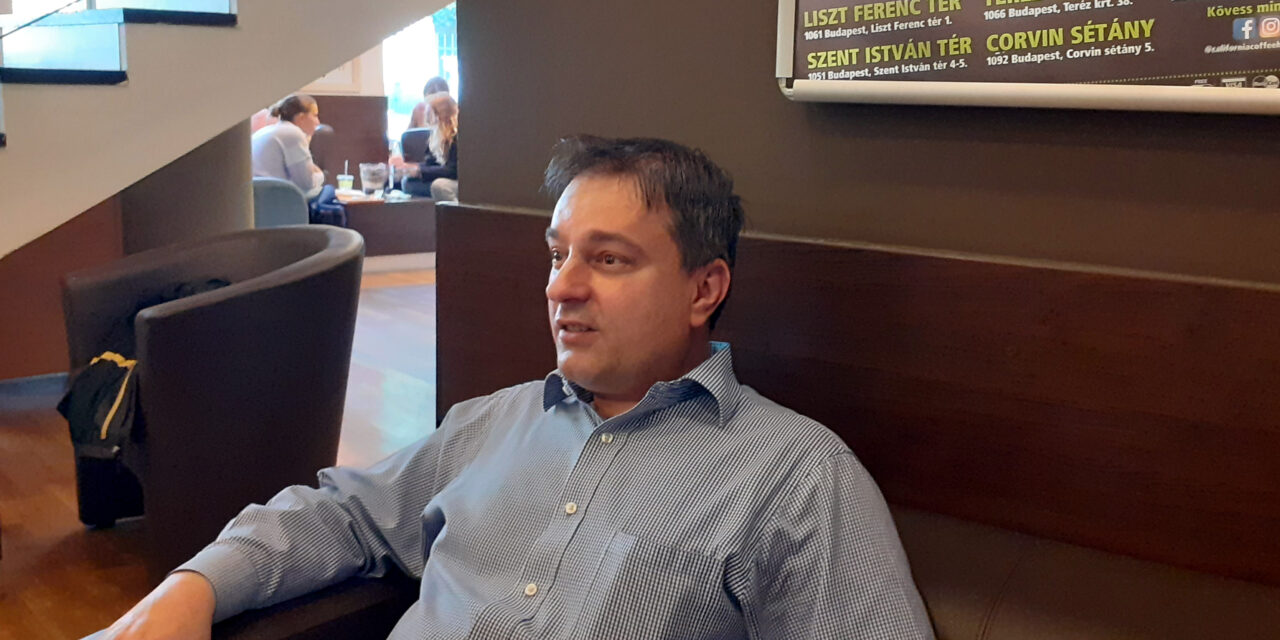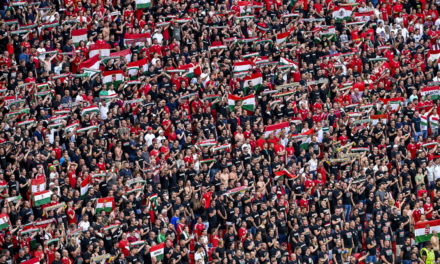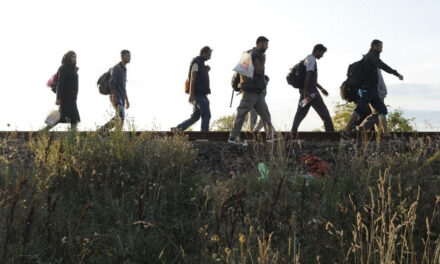Are German capitalists interested in who the population prays to, what the new migration pact means in practice, what effect would hot spots to be built outside our borders have, and what will our home look like in thirty years? Among other things, we discussed these questions.
Is it still true that the Germans hoped for manpower but got people? What do the latest data show about the labor market situation of immigrants in Western Europe?
The starting bases are the statistics that were prepared at the beginning of the 2010s, and according to them, the population of Europe will decrease by 40 million by 2050, i.e. without the British, we will only be 400 million. But the continent is built for 500 million people, the apartments, infrastructure, etc., and if several million people fall out of the system, there will be fewer consumers, soldiers, potential engineers, and doctors.
It permeates everywhere.
That's right, and consumption would also decrease, and it doesn't matter how many people pay into pension funds either. Now, two contributors support roughly one pensioner, but by 2050 there would be one or two pensioners per contributor. That is why they think that if the reproduction rate of Europeans is low, then fresh people should be brought in from outside. Hungary and Poland also managed to increase the number of births, from 1.2 to 1.5, but the Germans gave up on this. And they want to kill several birds with one stone: first of all, to keep the population of the continent at the same level, because they can only remain in economic competition with the USA and China if they keep the EU together, and if consumption decreases, the GDP will also decrease . Secondly, they want to see migration as a European problem and treat it as such, because this is the only way to find a unified European solution, and in this way to strengthen federalization. And their third goal is to provide cheap labor for their economy and to get voters who, if they get citizenship, will vote for pro-immigration forces. So these are the main goals. As for the specific question: roughly half of the more than 1.5 million people admitted five years ago work, but most of them typically work for the minimum wage, which is now 9.5 euros per hour. So we see that they were hardly able to find employment in professions with high added value.
Compared to what, what was the original expectation?
The fact that migrants learn the language within two years and acquire a profession within three years, even in parallel. But they also hoped that the incoming doctors and engineers would speak English from the start and be able to work after the naturalization of their diplomas, but it turned out that a Syrian diploma is not equivalent to a German one, and most of them could not even read and write.
And the immigrants did not come to take care of eighty-year-old Germans in nursing homes, but wanted to continue their previous lives, now in significantly better conditions.
This is why most of them, typically the later generations of Turkish guest workers, are employed in the service sector, working as döner sellers, greengrocers, taxi drivers, or in restaurants. There, language skills are not so necessary, and they can be among their own. So half of the newly arrived work, 10-20 percent of them in regular full-time jobs, while the majority in atypical employment, for example as temporary workers.
Don't these numbers scare the leadership of the Union so that immigration continues?
The alternative would be what the United Kingdom chose - migration was one of the root causes of Brexit - Boris Johnson switched to a regulated immigration, based on the Australian and Canadian model: if you speak English, one point, if you have children, another point, shortage profession, one more point, and if you move to where we say, one more point. By the way, the Germans have also slowed down the influx and family reunification, but this is only because their minister of the interior is from the CSU; if it was green or socdem, the situation would be different. They want regulated immigration, so their proposals are not intended to stop immigration at all, but to have it come in a coordinated manner. President Erdoğan's idea of ripping out 5,000 square kilometers from northern Syria, where Turkish companies would build a refugee city for two million people with EU funds, and where the rejected could be deported and the good ones selected - this would also facilitate this.
What changes according to the new migration pact?
With the help of immigrant human smugglers, he gets to Italy or Greece, where he submits his application, which now has to wait years, because the Greeks are not in a hurry to process it, so his only chance is for the Italian or Greek state to transfer him to the mainland. And there he escapes. And his goal is to be able to submit his asylum application again in Germany. And the Germans will not deport him back, so he can remain in "tolerated" status.
In contrast, the new package?
The bottom line is that from then on in Greece, you would not have to wait for years, but would decide within a week or two whether the immigrant has a chance to stay or not. If he can stay, he will be distributed among the other member countries, if not, he will be sent back to Turkey or his country of origin. And this is where deportation partnerships and deportation coordinator roles would come in.
What tasks are these?
Those who don't want to take in, are partnering with certain issuing countries and have to ensure that, for example, Tunisians rejected in Greece are taken back from Greece to Tunisia, as well as pressuring it to take back its own citizens. However, this does not work, because they have not been accepted back yet, since there is a population surplus there, which is why the majority of them are typically young, vigorous men who have not been dealt cards at home. And they used to send them in advance so that they could legally bring the others after the family reunification. This is usually why they claim to be minors.
So it won't even come into our view personally, only on paper. What can we do if it disappears?
Then nothing. Therefore, the plan is to take them into deportation custody by the Greek, Italian, or Spanish authorities. Of course, it should still work this way, only when the hot spots are full, the local authorities transport thousands or two thousand people to the mainland, from where they disappear.
If I were an immigrant, having paid a lot of money to come to the Union, I would hardly accept expulsion.
Just like them, you see, they are also breaking out of quarantine custody. To this, the Union says that Frontex must be strengthened, but in the new budget their resources have been reduced. So the idea is bleeding from several wounds, it is not possible to evaluate the applications in a few weeks, because no one wants to send immigration officers there. Then even more asylum seekers would have to be distributed.
All the proposals that can be found in the new package were already included in the previous ones, they did not work then, and it is not clear why they would work now, if neither more money nor more people are put behind them. The deportation partnership is actually just a bid for time, so that countries that don't want migrants accept that some kind of joint solution is needed.
And if this happens, they can say at any time that the deportation does not work anyway, and according to the quota, the asylum procedure will have to be conducted in, say, Hungary, as a result of which the immigrant will ultimately stay here.
What about the non-EU hot sports plan?
That's not good either. What Erdoğan says, that he will build a refugee camp for two million people with EU money, figuratively means how you catch a bug: you turn on the light and it flies there.
Vacuum effect?
Exactly. Both Macron and Kurz say, but unfortunately it is also among the Hungarian proposals, that hot spots should be created outside the EU, where the real refugees are selected. Yes, but then everyone will go there and ghettos will form around the hot spots, like on the border between the USA and Mexico. And of course this would also be a brain drain, because everyone would want to hire the most talented. Which is not very ethical, because if we cut off the top of the social pyramid of the issuing countries, they will only end up in an even more difficult situation in the long run.
Can we say that this pact only received a new guise, but its essence remained the same?
Of course, this is a smear, the aim of which is to keep the problem at the European level, since the integration part of migration is the one through which they could take away even more powers from the member states. What do they say in Brussels? If the same conditions are met for the immigrant from Lithuania to Portugal, intra-EU movement will not be attractive. Of course, this is not true either, because there are no mosques or imams in Lithuania, and they also go to Germany because they have their own community there. The system fails here as well, even if the living conditions were to be unified, if the Muslim community is already a given in Western Europe, but not in East Central Europe.
On the other hand, it could be argued that social policy and the education system should be unified due to the fixed number of immigrants arriving each year, i.e. more and more competences could be taken away from the member states.
Looking at the big picture, it looks like immigration will be with us for a long time. How long can EU political unity be maintained in this form, if there is an ever-widening worldview gap between the member states?
If we look from Brussels or Berlin,
they hope that in the next elections, the Hungarian and Polish governments will fall, and Macron will remain, and that pro-immigration governments will succeed in coming to power everywhere. The democratic process also serves to put the recalcitrants in the wrong corner.
The Germans are thinking of a United States of Europe, they have to maintain the empire, because that is the only way they can compete with the USA and China.
Is this a viable idea in the long term, with such tensions?
They see this as a calculated risk, accept immigration and hope that the consumer society is strong enough to attract the second and third generation of migrants.
It doesn't matter to a German capitalist who you pray to, as long as you are a cheap worker and a good consumer. And he doesn't care what Europe will become, because his child will still go to an elite school and live in a block of flats surrounded by stone walls.
You can get shot on the street, right?
Sure, but they hope it won't be so rough.
Does empiricism confirm that the second and third generations have joined the consumer society?
It shows that they live in a parallel society, and more than two-thirds of them, following the example of their parents and grandparents, remain Muslim, so the Koran is more important to them than the laws of the host country. And they expect to be accepted as Muslims. From this point of view, this model does not work. Social conflict is blamed on Western Europeans without much concern, and tensions are seen as a childhood illness that will pass.
Western consumer society is in many ways incompatible with Islam.
It still works if you look, for example, they only produce halal (permitted, clean - the ed.) Toblerone.
Of course, because the receivers adjust to the arrivals.
The goal is not to raise Europeans like you and me, or Hanzi, but to make the capitalist system in which the narrow elite control the majority work. The German politician is not interested in the well-being of the Germans, they want this model to remain even at the expense of the majority.
How long can this be called democracy?
It is part of the manipulation that we are accused, for example, of a lack of media freedom, even though the media is really the same everywhere in Western Europe. But west of the Elbe, people are used to believing what the newspaper says. Of course, some people suspect that what they write and say is not certain, but the majority still believes it. If we look at the election results, we see that the same elite remained in power, only now in a different coalition. So there is no alternative in the West.
Is it a fairy tale question that the Union may fall to pieces?
We must realize that it will not be migration that will explode the current status quo. By the way, this is a real question, because the Union is a peaceful empire, the Fourth Reich of the Germans. But the EU as we know it has reached the limit of its ability to perform, and what might bring it down is the euro. Marine Le Pen and Salvini already wanted to leave the euro zone, which is why the Brussels elite does not want to see them in power. Obviously, their election would blow up the union from within, and in ten years, if the right-wing governments remain, East Central Europe may be strong enough for the region to emerge as an independent pole, with the support of America or China.
If we are to be honest, Europe will be devalued and future conflicts will be fought in Asia. In Europe, political correctness and climate hysteria are tying up media freedom, science and the arts, so it is really sliding down, compared to the USA it is lagging behind in computer technology, and compared to China in medicine and manufacturing. We don't spend on the army, even though innovation usually comes from military technology, there is no risk capital, and the universities have also become comfortable.
The structures that work well in America, such as start-ups, are missing. In Central Europe, on the other hand, although it cannot catch up with the West in terms of proportions, the dynamics of growth may remain. This is also why the opening to the east is important, so that we don't only have free valences towards the west. Of course, America wants to banish both the Russians and the Chinese from Europe and keep us as a region still dependent on the West. In any case, if the Union splits, it will split in the West, not here, we still need Western Europe to catch up.
Just for fun: what will our world look like in 2050?
Presumably, China and India will compete for the role of the world's leading power, and Europe will become a kind of nostalgic island.
Like a holiday paradise?
Yes, say, like Switzerland or Austria now. A pleasant place where well-fed people eat and drink, like a Disneyland with a mixed population. It will still be nice to live in it, but innovation will no longer come from here. The question is, of course, whether we can defend ourselves, whether the other actors accept our status, or how well we can represent our own interests without an army, nuclear weapons, world currency and allies?
Featured image: 2022plus
The interview was conducted in 2020.













